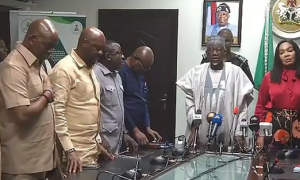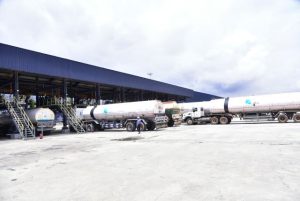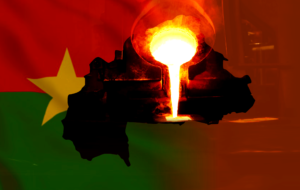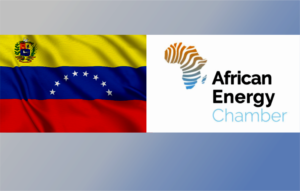Labour Rights vs Corporate Power: NUPENG Suspend Strike After Truce with Dangote, Government

The supposed NUPENG Industrial action highlights labour rights, monopoly fears and broader economic risks
Nigeria’s oil and gas sector exhaled in relief on Tuesday as the National Union of Petroleum and Natural Gas Workers (NUPENG) suspended its strike following a truce brokered by the Department of State Services (DSS). The high-stakes meeting in Abuja brought together federal government officials, Dangote Refinery executives, and labour leaders after days of disruption that underscored not just the fragility of petroleum supply chains but the broader fault lines between corporate power, labour rights, and government regulation.

The immediate trigger was the refinery’s reluctance to allow its employees to unionise freely. But behind this flashpoint lies a deeper contest over the shape of Nigeria’s industrial future: whether Dangote’s $20 billion refinery will operate as a national asset that coexists with organised labour, or as a corporate enclave whose dominance sidelines workers and competitors alike.
Union leaders warned that Dangote’s initial resistance to unionization resembled its cement-sector dominance, raising fears of a refinery monopoly that could dictate pricing, distribution, and employment practices. Independent marketers accused Dangote of trying to restructure fuel distribution in ways that could eliminate thousands of jobs in trucking and depot operations. Analysts say the incident shows how industrial giants, while providing massive infrastructure, can inadvertently crowd out smaller operators if unchecked by regulation.

The strike’s ripple effects were immediate. Across Enugu and Akure, filling stations shut down, forcing commuters to buy fuel at black-market prices of up to ₦2,500 per litre. In some areas, transport fares doubled, crippling households already stretched by inflation. Queues returned to petrol stations in scenes reminiscent of past nationwide shortages, with social media filled with stories of stranded motorists and spiraling daily costs. The disruption highlighted how quickly labour disputes in the oil sector translate into humanitarian crises for ordinary Nigerians.
The walkout by Dangote’s team from earlier negotiation rounds triggered outrage among labour unions, who called it a sign of corporate arrogance and disrespect to the federal government. For the Tinubu administration, which has staked political capital on the refinery as a cornerstone of energy security and economic revival, the standoff was a credibility test: balancing investor confidence with the need to uphold Nigeria’s labour laws. The DSS’s intervention, though unusual, underscored how industrial peace is now seen as a national security priority.
The dispute also revealed an overlooked dimension: the government is not just regulator but customer. With the refinery expected to supply much of Nigeria’s petrol and aviation fuel, the Abuja’s fiscal and service delivery commitments to power hospitals, keeping civil service operations running and provide basic energy for residents, depend on uninterrupted supply. So, a prolonged strike or strike of any timely-length, would have undermined the organised private sector transactions, public service delivery at the federal/state levels and intensifying public frustration with government.

The compromise allows Dangote Refinery workers who wish to unionize to do so under recognised labour bodies, while barring the creation of employer-controlled unions. A Memorandum of Understanding (MoU) signed by all parties commits to completing the process by September 22, 2025. Crucially, the MoU prohibits victimization of workers who choose to unionize, with monitoring mechanisms anchored at the Labour Ministry.
In the main time, the strike’s suspension restores calm. But the episode has exposed the delicate balancing act at the heart of Nigeria’s industrial policy: how to welcome large-scale private investment without eroding worker rights, creating monopolies, or exposing citizens to avoidable humanitarian shocks.
The Union leadership believes that they are not just fighting for workers at Dangote, but are fighting for the soul of Nigeria’s economy.






